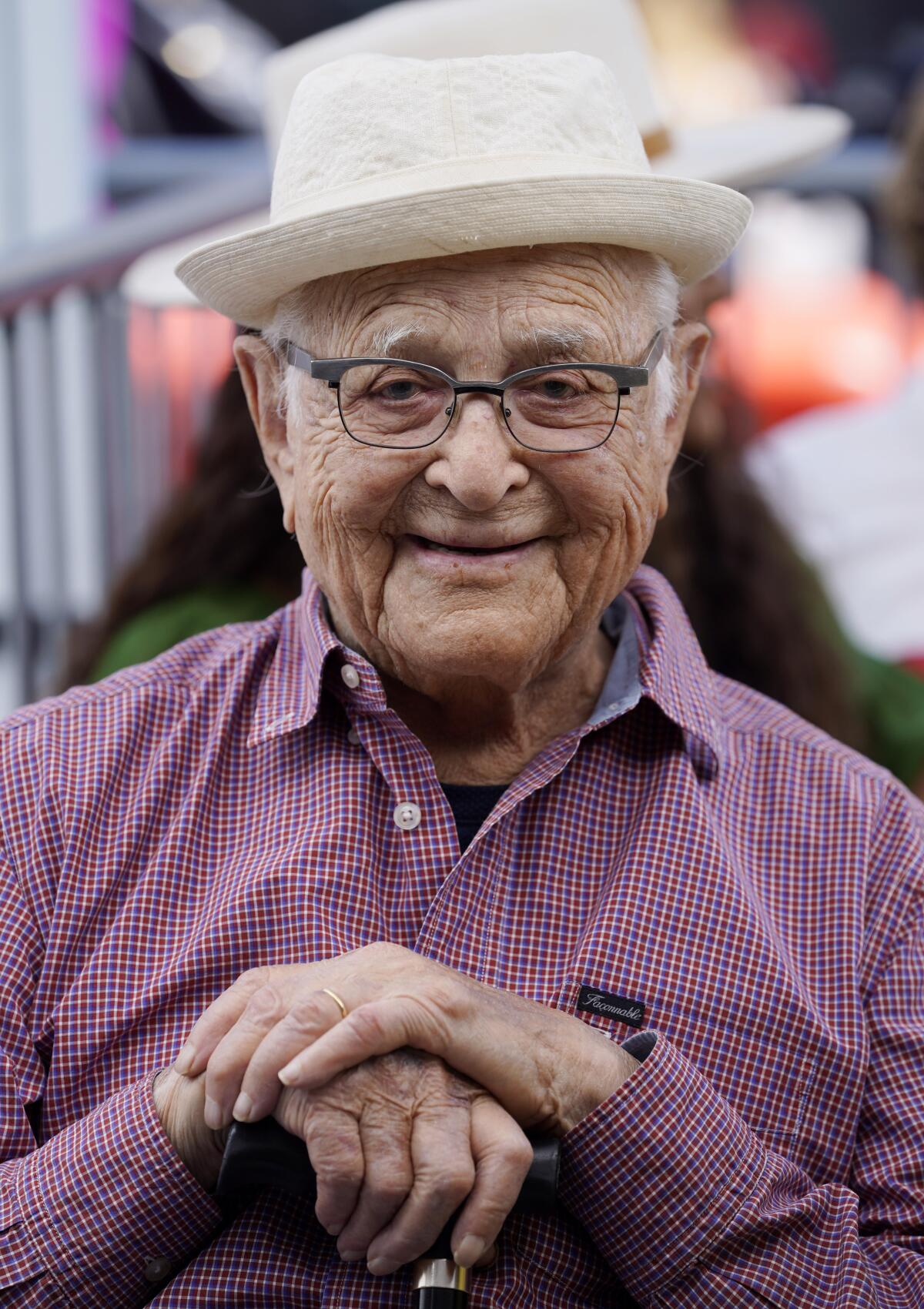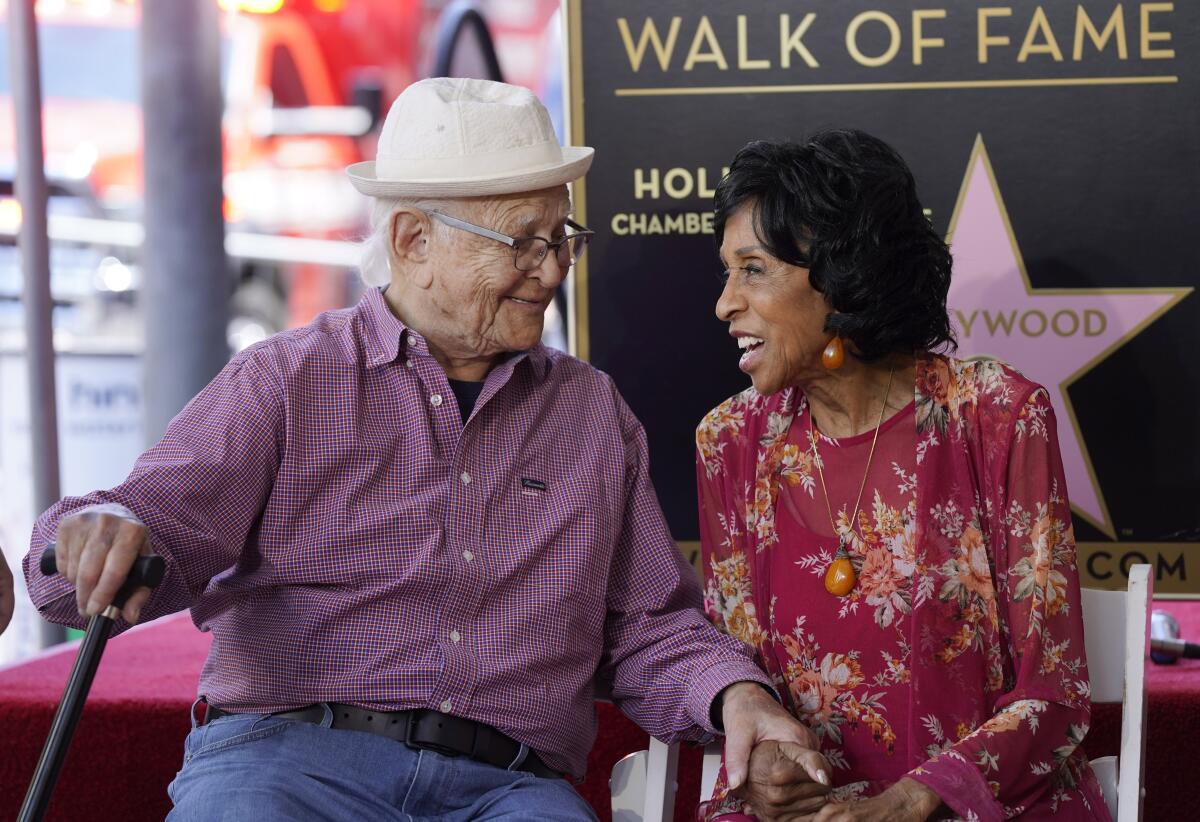The legendary Norman Lear had some sage advice for all of us about aging well

- Share via
Norman Lear popped up on my computer screen at the designated time, wearing his signature bucket hat. I’d waited weeks for the interview and knew I had to think fast, because Lear was busy — as always — juggling projects.
That was the point of the interview. He was 98 in 2020 and still working like an ambitious upstart. I was 30 years younger than him, contemplating retirement and researching a book about how to know when it’s time to go.
I’ll admit to being more than a little nervous. Lear, who died Tuesday at 101, was a legend, for one thing, a pioneer in the realm of prime-time TV shows that delivered social commentary along with entertainment. As a much younger guy, I half feared Lear might tell me to quit wasting his time.
California is about to be hit by an aging population wave, and Steve Lopez is riding it. His column focuses on the blessings and burdens of advancing age — and how some folks are challenging the stigma associated with older adults.
I asked Lear if he ever thought about retiring. He appeared to be in his kitchen, snacking on something, but he didn’t hesitate.
“Not for a second,” he said with an exclamation point, making me feel like maybe I should go get my own bucket hat, pull it down to my ears and get to work.
I had already talked to another Hollywood legend and Lear contemporary, Mel Brooks. I wanted to know if working, for them, was oxygen. If you stop working, you suffocate.
“When I go to sleep at night,” Lear told me, “I have something that I’m thinking. Among other things, it’s about something I’m doing tomorrow … a day in which there are things I wish to do. So today is over, and we’re on to the next.”
Here I was, making the vagaries of human existence more complicated than they needed to be as I tried to make sense of where I’d been and where I was headed in a year, in five, in 10.
Lear obligingly played therapist, saying he lived in the moment, which really is all any of us can do. He said that he was certainly grateful for all the accolades and awards tossed his way in an epic career, but that he didn’t dwell on the past as much as what was in front of him right now. Imagine you’re in a hammock, he said, and you’re swinging.
From over, to next. Over, to next.

“So long as I am interested in the next, I’m moving,” Lear said. “And there have been, for 98 years, a lot of wonderful nexts.”
Lear had an insatiable intellectual and spiritual hunger, and that, along with the luck of physical health, is key to a long and happy life. Recently, I hiked Griffith Park with a 100-year-old gent, Pete Teti, who is all about embracing change. As one friend explained: “He’s made two violins, he does engraving, he’s a painter, he’s currently creating animation, he’s constantly learning about physics, geometry, fractiles.”
At 93, Lear once asked, in a New York Times interview, “Aren’t you expected to grow, learn more about yourself, learn more about the world? Why would you be less expected to grow when you’re 80? The culture dictates how you behave, and maybe the elderly buy into it, the way they grow old. My role here now is to say wait a minute. That’s not all there is. There’s a good time to be had at this age.”
Marty Kaplan, director of USC’s Norman Lear Center — established in 2000 by the Lear family to study the impact of entertainment on society — said Lear was attending writers’ meetings and giving notes on current projects right up until the end.
But there was more to the man than work.
“The list of things associated with longevity — with centenarians — all apply to him,” Kaplan told me. “Family and love in your life is paramount, and for him, it always has been. And then, purpose, an awfully important thing. The sense that you matter.”
Another critical ingredient in the Lear recipe for aging well was gratitude, Kaplan said, citing Lear’s wartime service as a radio operator and gunner on dozens of World War II combat missions.
“He wasn’t just swinging in the hammock. He was reveling in the pleasure of being alive, in existence, and the sheer miracle of anything existing,” Kaplan said.
In our conversation, Lear wondered why I’d be contemplating retirement, given how much I loved my job. Well, I told him, there might be other things I’d love, but I’ve never had time to try them. I’d like to travel more, and maybe live in different places.
Lear suggested the best of both worlds was within reach. Maybe I could travel more, have new experiences, and write about it.
“It’s not retirement,” he said. “It’s on to the next.”
I took inspiration from Lear’s zest. Work might well have kept him breathing, but it was all of life he embraced. He kept probing, shining a light, speaking out about ignorance and division. He once had a pen pal relationship with President Reagan because he thought it was important to hear the perspectives of political opponents.
In a tribute on the USC center’s website, Kaplan said that Lear “moved our hearts and minds to embrace our common humanity and live up to what is best in us.”
He said that in the hours after Lear’s death, he was looking through his biography, “Even This I Get to Experience,” and was struck by the epigraph. It was a quote from George Bernard Shaw.
“You haven’t overcome the fear of death until you delight in your own life, believing it to be the carrying out of universal purpose.”
steve.lopez@latimes.com
More to Read
Sign up for Essential California
The most important California stories and recommendations in your inbox every morning.
You may occasionally receive promotional content from the Los Angeles Times.














